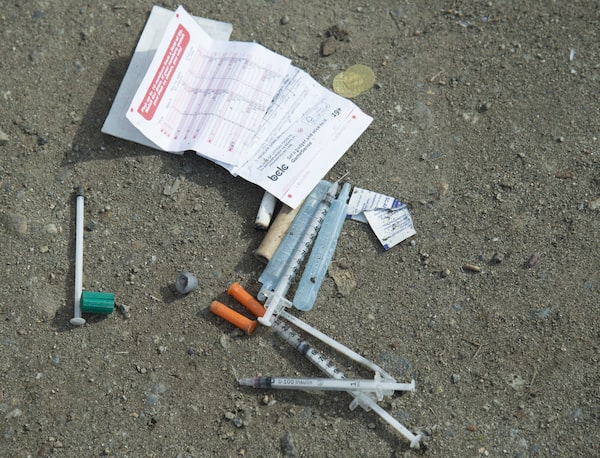
Needles are seen on the ground in Oppenheimer park in Vancouver's Downtown Eastside on March 17, 2020.JONATHAN HAYWARD/The Canadian Press
British Columbia’s government is seeking to overturn a B.C. Supreme Court judgment that suspended legislation designed to curb illicit drug use in public places as the province struggles to contain a worsening overdose crisis.
The toll of that crisis has reached a grim new magnitude: B.C.’s coroner reported Wednesday that the province set a record in 2023 for overdose deaths from unregulated drug use after 2,511 British Columbians died last year. Drug deaths in B.C. have climbed every year for the past decade, save for a dip in 2019.
The province is approaching the first anniversary of a three-year decriminalization pilot project, the first of its kind in Canada. The pilot project, which required federal approval, launched on Jan. 31, 2023. Since then, adults in B.C. have not been arrested or charged for possessing small amounts of certain illegal drugs most commonly associated with overdoses, nor are their drugs seized.
But decriminalization led to a backlash over drug use in public spaces, and the NDP government passed the Restricting Public Consumption of Illegal Substances Act in November, which would have allowed police to fine or imprison people who refuse to comply with orders not to use drugs in certain outdoor locations, including places frequented by children.
The provincial law, which prohibits drug use at outdoor recreation areas such as parks, beaches and sports fields, as well as within a six-metre radius of building entrances and bus stops, was suspended before it came into force after it was challenged in court. A judge agreed in December, ruling that new law “will cause irreparable harm” by forcing drug use back into the shadows.
In a statement Wednesday, B.C. Attorney-General Niki Sharma said her government is asking the courts to overturn the decision last month by B.C. Supreme Court Chief Justice Christopher Hinkson.
“We are determined to keep doing everything we can to fight the toxic drug crisis and treat addiction as a health matter rather than a criminal one, while recognizing that drugs should not be used in a range of public places frequented by children and families,” she said. “It is our view that the Act addresses this.”
In his ruling, Justice Hinkson agreed with the argument of the Harm Reduction Nurses Association that the new law would threaten the lives, health, safety and Charter rights of their clients. The association wanted a temporary injunction until it could launch a constitutional challenge of the law.
“It is apparent that public consumption and consuming drugs in the company of others is oftentimes the safest, healthiest, and/or only available option for an individual, given a dire lack of supervised consumption services, indoor locations to consume drugs, and housing,” Justice Hinkson wrote in his Dec. 29 ruling.
In its application to the B.C. Court of Appeal, the province argues that Justice Hinkson erred in fact, and in law.
The judgment was premature, overly broad and was “not firmly grounded on the evidence that was before him,” the application states. The Chief Justice failed to respect government’s legislative authority, the province argues.
“His order suspending the coming into force of an entire enactment failed to afford an appropriate level of deference to the legislative and executive branches of government in relation to their respective legislative functions, contrary to the constitutional principles of parliamentary sovereignty, judicial restraint, and the separation of powers.”
Decriminalization was introduced with few guardrails in place. Ottawa granted the exemption under the Controlled Drugs and Substances Act with only a few exceptions: kindergarten to Grade 12 school premises, child-care facilities, airports and in vehicles operated by a minor. At the province’s request last summer, Ottawa later amended the exemption to also prohibit illicit drug use in playgrounds, splash pads, wading pools and skate parks.
That amendment did not go far enough for community leaders who continued to raise public safety concerns. Several municipalities – including Campbell River, Port Coquitlam, Kamloops, Prince George, Sicamous, Penticton and Kelowna – introduced their own local bylaws banning drug use in public spaces, creating a patchwork of regulations.
The B.C. Association of Chiefs of Police, which supported the province’s effort to curb illicit drug use in public spaces, said Justice Hinkson’s ruling leaves police without the tools to address public consumption problems, especially in areas frequented by families and children.
B.C. Chief Coroner Lisa Lapointe, however, described Justice Hinkson’s decision as important and thoughtful. Speaking to reporters on Wednesday, she said criminalizing people who are harmed by illicit drug use is “illogical” and inconsistent with what medical experts advise.
“I think we need to be really careful when we respond to fear,” Ms. Lapointe said. “Seeing someone using drugs in public is not comfortable, but is that a risk to me? Is that a risk to my safety because I see that? And if we’re going to respond … to our vulnerable community members who are at risk, then wouldn’t it be better to have a public response that is going to help them?”
The BC Coroners Service reported that a record number of British Columbians died from toxic, unregulated drugs in 2023, up 5 per cent from the previous year. An average of seven people now die every day in B.C. owing to illicit drugs.
Illicit fentanyl was detected in 85.3 per cent of these deaths last year, and the primary mode of drug consumption is now smoking, accounting for 65 per cent of deaths last year.
In November, an expert panel struck by the coroners service recommended expanding access to pharmaceutical alternatives to illicit substances through non-prescriber models, which the province swiftly rejected.
 Justine Hunter
Justine Hunter Andrea Woo
Andrea Woo